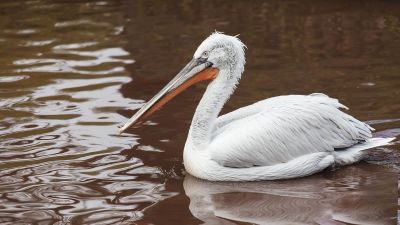Paignton Zoo: Case of bird flu confirmed at South West attraction

Paignton Zoo has confirmed one of its pelicans has tested positive for bird flu.
Wild Planet Trust, which runs Paignton Zoo, says it has had biosecurity measures in place for a while because of confirmed cases in the South West.
But it says it is not easy to protect the animals from flying wild birds and seagulls which go to the open site.
The zoo was closed on Monday 29 August when the case of avian influenza was first suspected. It will remain closed until at least Friday 2 September while the team works "tirelessly" to ensure the birds' safety.
The Department for Environment, Food and Rural Affairs (Defra) has now put in a 3km control zone around the zoo.
In a report, Defra said "affected birds will be humanely culled" but this has not been confirmed by the zoo or Defra.
A Defra spokesperson said: "At this point in time our next steps are unknown. Our course of action will be determined by the findings and subsequent requirements following the current Animal Plant Health Agency-led investigation."
In a post on its website, Paignton Zoo said it is working with the Animal Plant Health Agency to investigate the case.
It added: "Our priority at this time is to protect our birds and support our dedicated teams as they work to ensure compliance with APHA requirements. Our visitor services team are working to contact people who have made arrangements to visit and we thank everyone for their patience as we coordinate these tasks and try to minimise disappointment.
"Rest assured that anyone whose visit has been affected will be given the opportunity to rebook or to receive a refund.
"We will provide further updates as and when we have further information regarding test results. We are hopeful that we will be able to reopen soon but would urge all visitors to check our website or social media pages before travelling to ensure that they have the most up-to-date details of the situation.
"Avian influenza is a very serious disease and this past year has seen a dramatic increase in the number of cases nationally, with both captive and wild bird populations affected. The risk of transmission to humans from this strain of the virus is very low, but people are advised not to touch wild birds and to wash their hands thoroughly if in contact with birds or bird faeces."
Chief executive of Wild Planet Trust Dennis Flynn speaks to ITV News
Dennis Flynn, chief executive of Wild Planet Trust, said: "Paignton Zoo is part of Wild Planet Trust and our role is to protect at-risk species and to help stop species decline.
"So I've got a very experienced and competent team of people to look after the birds and we've been putting in enhanced biosecurity measures for some time.
"But as you rightly say, protecting against overflying wild birds and seagulls is very tricky and that may well be what's happened here."